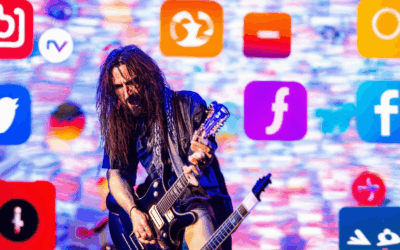Curious about how musicians from different corners of the world connect to create harmonious sounds? The ability to collaborate on music online has become a game-changer, offering unprecedented opportunities for artists to work together regardless of their physical location. Whether you’re a seasoned musician or just starting out, navigating the vast landscape of online collaboration tools and platforms can feel overwhelming. But fear not! In this comprehensive guide, we’ll dive into the ins and outs of music collaboration online, exploring the best tools, platforms, and strategies to help you succeed. From discovering the perfect collaborators to mastering real-time remote sessions, this article will equip you with everything you need to thrive in the world of online music creation.
Key Takeaways
- Find Musicians Globally: Use platforms like Vampr, Kompoz, and Music Producer Hub to connect with musicians worldwide.
- Network on Social Media: Engage with music communities on Facebook, Instagram, and Twitter to build connections.
- Attend Live Events: Build organic relationships by attending music shows, festivals, and open mic nights.
- Join Online Forums: Participate in Reddit’s r/MusicProduction and other forums to meet like-minded musicians.
- Collaborate with Producers: Reach out to producers via platforms like ProducerLoop for mixing, mastering, or full production.
- Team Up with Local Bands: Partner with local bands to combine skills and ideas for your projects.
- Use Licensing Platforms: Access royalty-free tracks on Audiotrackz and Royalty Free Zone for your creative projects.
- Network at Conferences: Attend events like SXSW and A3 Festival to meet industry professionals and musicians.
- Hire Production Services: Utilize Fiverr and Upwork to find skilled collaborators for your music projects.
- Discover Talent on YouTube & SoundCloud: Follow genres and channels to find emerging artists for collaborations.
- Approach Musicians Confidently: Express admiration, highlight style alignment, choose the right medium, and stay respectful.
- Offer Flexible Collaboration Ideas: Present multiple project ideas to accommodate musicians’ availabilities.
- Use Remote Collaboration Apps: Explore tools like JamKazam, BandLab, Smule, and iOrbit for real-time music making.
These insights highlight effective strategies and tools for successful online music collaboration, ensuring you connect, communicate, and create with the right partners.

How to Collaborate on Music Virtually
Virtual collaboration has become a cornerstone of modern music production, allowing artists to work together regardless of geographical boundaries. Here’s a step-by-step guide to effectively collaborate on music virtually:
- Choose the Right Platform: Select a collaboration tool that suits your team’s needs. Popular options include Discord for real-time communication, Zoom for virtual meetings, and Google Workspace for document sharing and project management.
- Set Up Equipment: Ensure everyone involved has reliable internet connectivity, headphones, and quality microphones or audio interfaces. Clear audio and video are essential for seamless collaboration.
- Schedule Regular Meetings: Establish a consistent meeting schedule to discuss progress, share ideas, and align on next steps. Time zone differences should be considered to maximize attendance.
- Communicate Effectively: Use chat features, shared documents, and note-taking apps to keep everyone on the same page. Regular updates and feedback sessions can prevent misunderstandings.
- Manage Time Wisely: Create a project timeline with clear deadlines for each task. Use tools like Trello or Asana to track progress and assign responsibilities.
- Resolve Conflicts Constructively: Address disagreements promptly and respectfully. Focus on finding mutually beneficial solutions rather than winning arguments.
- Celebrate Milestones: Acknowledge and celebrate achievements, whether it’s completing a section of a song or meeting a key deadline. This fosters motivation and teamwork.
By leveraging these strategies, you can overcome the challenges of virtual collaboration and create music that resonates with audiences worldwide. Remember, clear communication, organization, and adaptability are key to successful virtual teamwork.
How to Play Music Together Online
Yes, there are several ways to play music together online. One popular platform is Jamulus . With Jamulus, you can collaborate with friends, bandmates, or anyone online in real-time. It offers high-quality audio with low latency, making it ideal for rehearsals or jams.
Additionally, you can use platforms like Spotify , Apple Music , or YouTube Music . These platforms allow you to stream music and share tracks, which can be a great way to explore and enjoy music together virtually.
For a more interactive experience, consider using apps like Audiomate or Music Maker . These tools enable live collaboration, allowing you to record and mix tracks with others online.
Steps to Get Started
- Choose a Platform: Select an app or service that supports online collaboration, such as Jamulus, Spotify, or YouTube Music.
- Sign Up or Log In: Create an account or log in to your preferred platform.
- Invite Friends: Share the link with your collaborators and wait for them to join.
- Start Playing: Once everyone is connected, begin playing or recording your music together.
Remember to ensure you have a stable internet connection and compatible devices, such as headphones, to minimize audio issues. With these tools, you can easily play music together online and create amazing musical experiences from anywhere in the world!

How to Get a Music Collaboration
To secure a music collaboration, follow these organized steps:
- Identify Potential Collaborators
Start by exploring platforms like SoundCloud or Instagram to discover artists who share your musical style. Engage with their content and leave thoughtful comments to establish a connection. - Reach Out via Social Media
Send direct messages on platforms like Facebook or Twitter . Personalize your message by highlighting what you admire about their work and how you believe your styles could complement each other. - Offer Value First
Before asking for a collaboration, propose adding value to their project. Offer to feature their music on your platform, create a remix, or contribute production skills to entice them to join forces. - Attend Events and Festivals
Networking at live events or virtual festivals can help you meet like-minded musicians. Attend events and engage with attendees to build meaningful connections. - Build a Strong Online Presence
Create a professional bio and portfolio showcasing your work. Include links to your music and past projects to attract serious collaborators who recognize your talent and dedication. - Be Patient and Persistent
Building relationships takes time. Keep reaching out and following up with artists you admire. Consistency and genuine interest will increase your chances of securing a collaboration.
By following these steps, you can effectively navigate the music industry to find the perfect collaborator and create amazing joint projects.

How to Find Musicians to Collab With
Looking to team up with like-minded musicians to create something amazing? Whether you’re a solo artist, producer, or band member, finding the right collaborators can feel like searching for a needle in a haystack. Here’s a step-by-step guide to help you find the perfect musical partners:
1. Use Collaboration Platforms
There are numerous platforms designed to connect musicians worldwide. Some popular ones include:
- Vampr – A global network for musicians to connect, share tracks, and collaborate remotely.
- Kompoz – A platform where artists can upload their work, browse tracks, and reach out to potential collaborators.
- Music Producer Hub – A community-driven platform for producers and musicians to collaborate on projects.
- Beatport – Known for its extensive library of royalty-free beats and tracks, Beatport is a great place to find collaborators.
2. Leverage Social Media
Social media is a powerful tool for networking. Platforms like Facebook , Instagram , and Twitter allow you to join groups and communities dedicated to music production and collaboration. Look for groups related to your genre or style and engage with members by commenting on posts or sharing your work.
3. Attend Local Events and Shows
Collaboration often happens organically at live events. Attend local music shows, festivals, or open mic nights to network with performers and musicians. Strike up conversations and exchange contact information to explore potential collaborations.
4. Utilize Online Communities
Online forums and communities like Reddit or specialized music forums can connect you with musicians who share your passion. Participate in discussions, share your work, and offer collaborations to like-minded individuals.
5. Reach Out to Music Producers
Music producers are essential collaborators for any project. Websites like ProducerLoop allow you to search for producers based on your needs, whether it’s for mixing, mastering, or full production.
6. Join Forces with Local Bands
If you’re in a band or a solo artist, consider reaching out to other bands or musicians in your area. Collaborating with a group can bring fresh ideas and diverse skills to your project.
7. Use Music Licensing Platforms
Platforms like Audiotrackz and Royalty Free Zone connect creators with high-quality tracks that can be licensed for your projects. This is a great way to find pre-existing music that fits your vision.
8. Network at Music Conferences
Attending music conferences and workshops can provide valuable networking opportunities. Events like A3 Festival and SXSW are excellent places to meet musicians and industry professionals.
9. Use Music Production Services
Some music production services like Fiverr and Upwork connect you with experienced producers and musicians who can help bring your vision to life. Post your project and receive bids from qualified collaborators.
10. Explore YouTube and SoundCloud
YouTube and SoundCloud are great platforms to discover emerging artists and musicians. Follow channels and playlists dedicated to your genre, and reach out to creators whose work you admire. Building connections here can lead to exciting collaborations.
Remember, collaboration is a two-way street. Be open to feedback, willing to compromise, and always professional in your communications. With these tools and strategies, you’ll be well on your way to finding the perfect musical partners!
How to Ask a Musician to Collaborate
To approach a musician for collaboration, consider the following steps:
- Express Clear Interest:** Start with a genuine expression of admiration for their work. Compliment their style or a specific piece that inspires you.
- Highlight Mutual Compatibility:** Explain how your musical styles or skills align, showing you’ve researched their work and see potential in a collaboration.
- Choose the Right Medium:** Whether via email, social media, or a mutual connection, tailor your approach to their preferred platform and timing.
- Be Enthusiastic and Personalized:** Show passion and make it personal by mentioning specific aspects of their work that excite you.
- Offer Flexibility:** Present a couple of ideas or approaches to accommodate their availability and preferences.
- Respect Boundaries:** Understand that a “no” is okay and maintain professionalism in all interactions.
- Prepare for Follow-Up:** If no response, respect their space and consider reaching out again in a polite manner.
Example Message:
By combining these strategies, you can approach musicians confidently and respectfully, increasing the likelihood of a successful collaboration.

Is There an App for Musicians to Play Together?
Yes, there are several apps designed for musicians to collaborate and play together remotely. One popular option is:
- JamKazam – This app allows musicians to play live sessions with others over the internet, featuring high-quality audio and low latency. It’s a great choice for real-time collaboration.
- BandLab – Known for its user-friendly interface, BandLab offers online jamming sessions where musicians can record and share tracks in real-time.
- Smule – Another excellent platform for remote performances, Smule connects musicians globally for live jams and recording sessions.
- iOrbit – This app provides a space for musicians to join or create virtual bands, allowing for collaborative music-making experiences.
These apps enable musicians to connect, play together, and create music from anywhere in the world. Whether you’re looking to jam casually or work on a project, there are plenty of options available.
Explore these platforms to find the best fit for your musical needs!



0 Comments